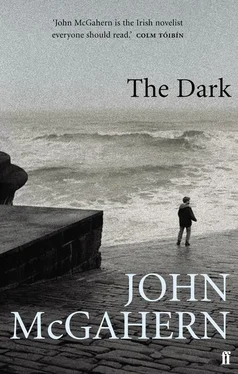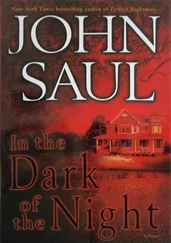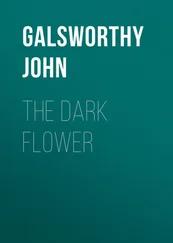John McGahern - The Dark
Здесь есть возможность читать онлайн «John McGahern - The Dark» весь текст электронной книги совершенно бесплатно (целиком полную версию без сокращений). В некоторых случаях можно слушать аудио, скачать через торрент в формате fb2 и присутствует краткое содержание. Год выпуска: 2002, Издательство: Penguin Books, Жанр: Современная проза, на английском языке. Описание произведения, (предисловие) а так же отзывы посетителей доступны на портале библиотеки ЛибКат.
- Название:The Dark
- Автор:
- Издательство:Penguin Books
- Жанр:
- Год:2002
- ISBN:нет данных
- Рейтинг книги:5 / 5. Голосов: 1
-
Избранное:Добавить в избранное
- Отзывы:
-
Ваша оценка:
- 100
- 1
- 2
- 3
- 4
- 5
The Dark: краткое содержание, описание и аннотация
Предлагаем к чтению аннотацию, описание, краткое содержание или предисловие (зависит от того, что написал сам автор книги «The Dark»). Если вы не нашли необходимую информацию о книге — напишите в комментариях, мы постараемся отыскать её.
The Dark — читать онлайн бесплатно полную книгу (весь текст) целиком
Ниже представлен текст книги, разбитый по страницам. Система сохранения места последней прочитанной страницы, позволяет с удобством читать онлайн бесплатно книгу «The Dark», без необходимости каждый раз заново искать на чём Вы остановились. Поставьте закладку, и сможете в любой момент перейти на страницу, на которой закончили чтение.
Интервал:
Закладка:
We went back to the monastery during the lunch hour, the interest changing to the next paper at two, what’d be on, and it was over at five. I was cycling home same as usual except more spent after the excitement. It hadn’t been very terrible. Tomorrow would be another day, History, some things I wanted to go over to make fresh. That night was less restless, before the end of the fortnight it had grown much the same as ordinary schooldays, only for the challenge of each new paper.
Tea was given to the class in the community parlour the last day. Benedict made a short speech. Five years at the school were over for us, he said. There’d been differences, no one wanted to shut his eyes to the fact, but differences were a fact of life, and they had, if you could put it that way, agreed to differ, and carried on. The important thing was that they had carried on. Now it was over. They were going out from the shade of the school into life … it went, and one by one when he had finished we came and thanked him and Brother Patrick.
There was certain pain leaving for the last time, getting the bicycle out of the big room, wheeling over that sanded yard of so much soccer, the lawn and concrete path and lilac tree for the last time, the teachers walking on that concrete in the breaks all the years, up and down, a mystery what they talked about.
Through the green gate with the cross above it facing the Leitrim Road for the last time. Down the town: the shops, Flynn’s and Low’s, the town clock, past the barracks, and over the stone bridge across the Shannon, Willie Winter’s garage and the galvanized paling about the football pitch of the Streets’ League.
They were gone, the places in their days, probably able to see them again but never this way, coming from the day of the school. Part of my life had passed in them, it was over, to name them again was to name the dead life as much as them, frozen in the mystery of love.
Yet the surface of it was that I had cycled past them hundreds of evenings without paying the slightest attention. I knew them only now when they were lost, I’d loved them without knowing, and only learned of the love in the losing, and I cycled past the trees and houses of the road, the quarry, afraid to think: and Mahoney read the last paper greedy as he’d read all the others when I got home.
“So it’s over,” he said. “I’m afraid I wouldn’t have made much of a fist of any of it.”
“You would if you’d been taught, if you’d studied for it. It wasn’t so hard.”
“Nothing’s hard if you have the know-how, it’s only hard if you don’t. And you think you managed it alright?”
“I think I did.”
“Time’ll soon tell that. And whether the others did better.”
“That’s the question,” I was able to laugh. I didn’t care, the dice was thrown, I’d have to wait to read its fall, that was all.
“That’s the question,” Mahoney repeated. “The one certain thing is that there’s not places for everyone.”
“Dog eat dog,” Mahoney muttered in an abstraction over the red paper, the conversation fading.
“Dog eat dog, who’ll eat and who’ll be eaten, and what’ll the eaters and the eaten do,” there was at least grim laughter.
“Go on aten, and being et,” Mahoney said.
“I suppose.”
“May you be lucky anyhow. That’s all there’s for me to say. And may you be lucky with your luck,” he said, an old prayer. He took his hat off the sill. I watched him go.
“There’s still work to be done, exams or no exams.”
I gathered and put away the books that night. The nights of slavery, cramming the mind for the exam, most of it useless rubbish, and already being forgotten. The most that was left was some of the Latin lyrics, their strange grace; Macbeth ; some poems; and the delight of solving the maths problems, putting order on their enclosed world, proving that numbers real and imaginary had relationships with each other. That was all. The quicker the rest went out of the head the better. One by one I put the books away, a kind of reverence, my life same as by the shops of the town had passed over these pages, it was over, but there were too many kinds of deaths, and no one’s life was very important except to himself or someone else in love with it.
Outside the windows of the room the fields I’d been brought up on stretched to their stone walls, yellow moss and streaks of marvellous white lichen on the grey limestone, some trees green in summer and grazing cattle breaking the green monotony.
24
THE NEXT DAY WAS NEW AND FREE, NO BURDEN OF SCHOOL. HE found old work-clothes and went back with Mahoney to the fields, malleting stakes into the ground to hang barbed wire to split the pastures, and he was painfully soft, arms leaden by the afternoon, barely able to drag feet by night, pissing on the hands and letting the piss dry in an attempt to get the blistering skin hardened. Not able to stay awake after tea, and the night one unconscious sleep till he was woken by clattering buckets late in the yard in the morning, groaning with the ache of the muscles as he put on clothes, out for another day.
Haytime came, the blades of grass shivering on the tractor arm, the turning and the shaking, its dry crackle against the teeth of the raker, the constant rattle of the teeth down again on the hard meadow after lifting free. The fragrance of new hay drenched the evening once the dew started and they were building high the cocks. Joy of a clean field at nightfall as they roofed the last cocks with green grass and tied them down against the wind.
The smell of frying bacon blew from the house as they finished, hay and hayseed tangled in their hair and over their clothes as they walked towards the house, a gentle ache of tiredness. They shared something real at last. They’d striven through the day together, the day was over. No thought or worry anywhere, too tired and at peace to think. The dew was coming down, a white ground mist rising after the heat, a moon pale and quiet above the mushroom shapes of the beeches.
“Twenty cocks in the Big Meadow. Sixteen in the Rock. It’ll more than fill the shed. We’ll have to throw up a small rick besides. It’ll take an Atom Bomb to starve the cattle this winter. No snow will do it,” Mahoney laughed his satisfaction into the evening.
“We did a good day,” he was content, brown with sun, touched by the extraordinary peace and richness, even the huge docks under the apple trees, of the evening.
There was the delight of power and ease in every muscle now, he’d grown fit and hard, he’d worked into the unawareness of a man’s day.
“There’s not many would keep pace with the two of us. You’ve come into your own since the exam.”
A hare looped out of the mist and stood. It raised itself, forepaws in the air, one paw crooked, the ears erect. The vague swirl of mist about it seemed to freeze into the intensity of the listening as they stood dead to watch.
It seemed as if it must shudder in the air with the intensity before it fell quietly down again, uncertain, not knowing what way to flee.
“Hulla, hulla, hulla,” Mahoney suddenly shouted and it bounded away, disappearing between the green oaks vague at the head of the meadow.
The sleepy cries of the pigeons sounded from Oakport.
“The wood’s full of them pigeons. They’ll not leave a pick of cabbage on the stumps if they get a chance. They give me the creeps. Cuckoos with hoarse throats.”
The tracks of boots left vivid wet splashes on the grass. The frying bacon came stronger, the saliva already too eagerly filling the mouth. Pleasure of drenching the face and arms, the back of the neck, with cold water outside, sitting fresh to the meal on the kitchen table; as later sleep would come before the heaven of a mattress and cool sheets could be enjoyed.
Читать дальшеИнтервал:
Закладка:
Похожие книги на «The Dark»
Представляем Вашему вниманию похожие книги на «The Dark» списком для выбора. Мы отобрали схожую по названию и смыслу литературу в надежде предоставить читателям больше вариантов отыскать новые, интересные, ещё непрочитанные произведения.
Обсуждение, отзывы о книге «The Dark» и просто собственные мнения читателей. Оставьте ваши комментарии, напишите, что Вы думаете о произведении, его смысле или главных героях. Укажите что конкретно понравилось, а что нет, и почему Вы так считаете.












